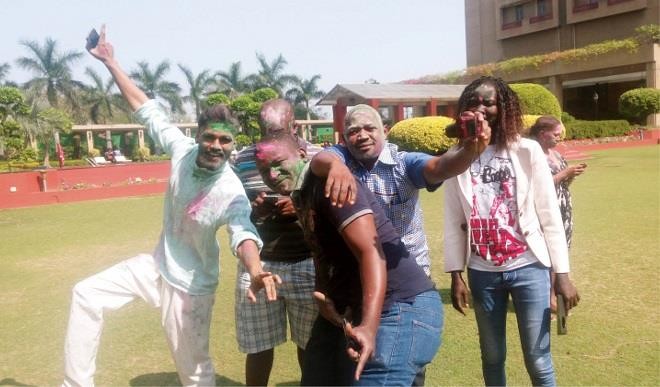Day African journalists celebrated Holi festival in New Delhi
It was celebration galore on Monday, 13th March 2017 in major parts of India, including New Delhi, as Indians celebrated the annual Holi festival of colours. The festival signifies the victory of good over evil, the arrival of spring and end of winter. For many, it’s a day to meet others, play, laugh, forgive and […]


It was celebration galore on Monday, 13th March 2017 in major parts of India, including New Delhi, as Indians celebrated the annual Holi festival of colours.
The festival signifies the victory of good over evil, the arrival of spring and end of winter. For many, it’s a day to meet others, play, laugh, forgive and forget.
The celebration, which started on Saturday, 11th, climaxed on Monday 13th March with a public holiday declared by the Indian government. All businesses and public places were closed because of the festival.
Visitors were advised to stay indoors to avoid being splashed with liquid and powdery colours.
At the Eros Hotel in New Delhi, where 30 African journalists were accommodated by the Indian government for two weeks training on News writing and reporting, the Holi festival was celebrated in grand style.
Two Nigerians, Ismail Mudashir of the Media Trust, publishers of the Trust titles, and Mr. Makut Simon Macham of the Nigerian Television Authority (NTA) were among the trainees.
The journalists, selected from 23 African countries, were being trained at the Jamia Millia Islamia University, New Delhi. The training was organized by the Indian government through its Ministry of External Affairs.
For about three hours on that day, the journalists and other guests at the Hotel participated in the celebration. They danced to Indian music, played with colours and were treated to sumptuous local Indian cuisine.
The Guests Relations Manager of Eros Hotel, Meera Pathak, described Holi as “a very big and auspicious festival celebrated in the northern part of India. Its essence is to showcase the victory of good over evil. It is more or less a religion,” she said.
A Zambian journalist, Ms. Helen Kalonje Zulu, described the celebration as awesome.
Helen, who works with the Times of Zambia, said “I am happy to be a part of the celebrations; it was an awesome experience considering that I come from a country which doesn’t have such a festival.
“I only see it in movies, so participating in this year’s Holi was such a wonderful experience I will live to remember. What I like most is the fact that the festival brings people together, which is so beautiful I must say,” she said.
A Canadian volunteer in India, Cloudia Paradi, said the festival gives the Indian the excuse to be ‘crazy’.
Paradi said he was excited by the way the Indians play with colours during the celebration.
“It is a celebration of life, and colours, and for the Indian, an excuse to be naughty. It gives them the opportunity to misbehave, play tricks, splash water and all sorts on their bosses as well as on the influential among them. It is really a crazy festival,” he said.
An Ethiopian journalist, Pawlos Belete, described the celebration as spectacular. Belete, who works with the Walta Information Centre, said “As a first time visitor in India, I found the colour festival breathtaking. It’s fun and interesting.”
However, an Indian trader at Nehru’s place, Syed Rehman Nawaz, said he does not celebrate the festival.
“Holi is an Indian festival for non Muslims. It is actually a Hindu festival where they move around a tree and the next day play with colours. You know India is a diverse country,” he said.
Nawaz said he does not celebrate the festival because, “it is against my religion. No Muslim does it; it is just a Hindu festival. It is fine, it is their festival, and so they should enjoy it,” he said.
During the celebration, our correspondent came across a retired journalist, Robbi kashyap (63) who doesn’t celebrate the festival. Kashyap, who retired at the Tribune of Chandigarh in Northern part of India, said “I don’t like the festival but I enjoy watching it.”
